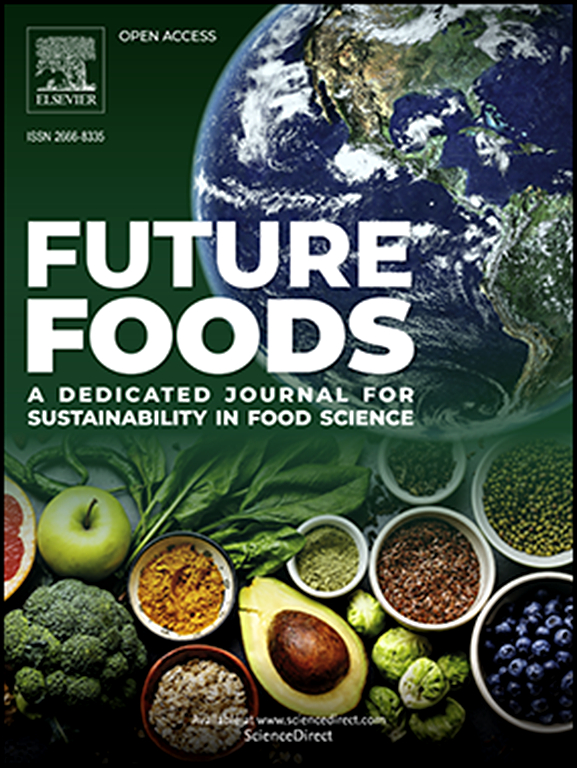European consumer acceptance of circular practices in chicken meat production: Exploring the impact of environmental attitudes and educational level
IF 8.2
Q1 FOOD SCIENCE & TECHNOLOGY
引用次数: 0
Abstract
The food industry requires sustainable solutions to address environmental challenges and resource scarcity. This study examines acceptance of two circular economy practices in the poultry meat industry, analysing consumer attitudes towards sustainability: the use of agro-industrial by-products in animal feed and the development of biodegradable packaging from chicken feathers. This study uses Partial Least Squares Structural Equation Modelling (PLS-SEM) to evaluate data extracted from 1967 participants from four European countries (Spain, Denmark, UK and Poland). The results highlight the strong correlation between consumer awareness of circular economy concepts and support for the environmental attitudes considered (environmental threat, ecocentric concern and personal conservation behaviour). Consumer acceptance is significantly influenced by environmental attitudes (p < 0.001), openness to new sustainable food technologies (p < 0.001), food waste reduction behaviours (p < 0.01), and circular economy knowledge (p < 0.05). Cross-country differences show that in Denmark and the UK circular economy knowledge is more integrated into consumer acceptance, while the impact is lower in Spain and Poland, which requires adapted strategies. Education also plays a key role, with university-educated consumers showing greater openness to circular innovations. These findings underline the importance of adapting policies and educational efforts to local contexts, offering actionable insights for policymakers and the agro-food industry to promote sustainable food systems through resource-efficient and waste-reducing innovations.
欧洲消费者对鸡肉生产循环实践的接受程度:探索环境态度和教育水平的影响
食品工业需要可持续的解决方案来应对环境挑战和资源短缺。本研究考察了禽肉行业对两种循环经济做法的接受程度,分析了消费者对可持续性的态度:在动物饲料中使用农业工业副产品和开发由鸡毛制成的可生物降解包装。本研究使用偏最小二乘结构方程模型(PLS-SEM)来评估来自四个欧洲国家(西班牙、丹麦、英国和波兰)的1967名参与者的数据。研究结果强调了消费者对循环经济概念的认识与对所考虑的环境态度(环境威胁、生态中心关注和个人保护行为)的支持之间的强烈相关性。消费者接受程度受环境态度(p < 0.001)、对新的可持续食品技术的开放程度(p < 0.001)、减少食物浪费行为(p < 0.01)和循环经济知识(p < 0.05)的显著影响。跨国差异表明,丹麦和英国的循环经济知识更多地融入了消费者的接受程度,而西班牙和波兰的影响较低,这需要调整策略。教育也起着关键作用,受过大学教育的消费者对循环创新表现出更大的开放态度。这些发现强调了使政策和教育工作适应当地情况的重要性,为决策者和农业食品行业提供了可操作的见解,以通过资源节约型和减少浪费的创新促进可持续粮食系统。
本文章由计算机程序翻译,如有差异,请以英文原文为准。
求助全文
约1分钟内获得全文
求助全文
来源期刊

Future Foods
Agricultural and Biological Sciences-Food Science
CiteScore
8.60
自引率
0.00%
发文量
97
审稿时长
15 weeks
期刊介绍:
Future Foods is a specialized journal that is dedicated to tackling the challenges posed by climate change and the need for sustainability in the realm of food production. The journal recognizes the imperative to transform current food manufacturing and consumption practices to meet the dietary needs of a burgeoning global population while simultaneously curbing environmental degradation.
The mission of Future Foods is to disseminate research that aligns with the goal of fostering the development of innovative technologies and alternative food sources to establish more sustainable food systems. The journal is committed to publishing high-quality, peer-reviewed articles that contribute to the advancement of sustainable food practices.
Abstracting and indexing:
Scopus
Directory of Open Access Journals (DOAJ)
Emerging Sources Citation Index (ESCI)
SCImago Journal Rank (SJR)
SNIP
 求助内容:
求助内容: 应助结果提醒方式:
应助结果提醒方式:


